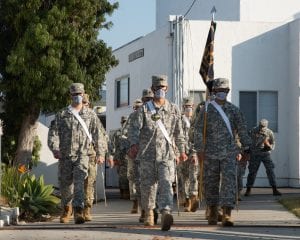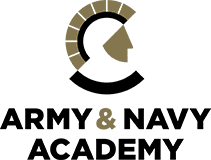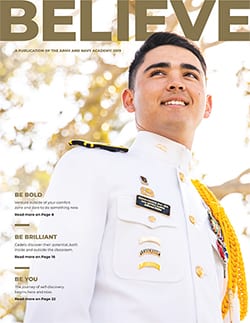 The Cadets, teachers, and staff members who have returned to the Army and Navy Academy campus for the beginning of the 2020-21 school year have found a large number of health and safety protocols that weren’t in place prior to the outbreak of the COVID-19 pandemic that closed the campus early last spring.
The Cadets, teachers, and staff members who have returned to the Army and Navy Academy campus for the beginning of the 2020-21 school year have found a large number of health and safety protocols that weren’t in place prior to the outbreak of the COVID-19 pandemic that closed the campus early last spring.
The new measures are in place for good reason. The Academy’s leaders and other education professionals believe an in-person education in which students interact with fellow students and teachers provides the best educational experience. In order to provide that level of personalized education, the new health safety measures being implemented by the Academy totally comply with and, in some cases, exceed the protocols developed by San Diego County, state, and federal public health agencies as well as those set in place by independent school organizations.
What are the COVID-19 symptoms how is it spread?
The symptoms that the Academy Health Center staff and others on campus are on the lookout for include fever, coughing, and shortness of breath which typically appear 2 to 14 days after being exposed to the virus. According to the Centers for Disease Control (CDC) and other public health agencies, the COVID-19 virus is transmitted by person-to-person contact through the exchange of respiratory droplets. The tests administered to people indicate one of three results: (1) Negative (at the time the test was administered); (2) Positive but with no symptoms apparent (at the time the test was administered); (3) Positive with symptoms.
What re the guidelines and mandates in place at the Academy?
Here is a closer look at the guidelines and mandates that are now being implemented on our beachfront campus in Carlsbad, Calif.
- Cadets, faculty members, and staff must wear face coverings and observe physical distancing (staying at least six feet apart from others) while on campus. Wellness assessments are given prior to all persons entering the campus as well as daily wellness checks and periodic testing of Cadets and other on-campus personnel.
- The Academy’s classrooms, dormitories, the dining hall, chapel, recreation room, store, and other campus facilities have been outfitted with sanitation stations where Cadets and staff members are directed to wash their hands with soap or use sanitizers (1) when entering the campus and buildings, (2) before eating or drinking, (3) after taking off or putting on face coverings, (4) after using the restrooms, (5) when hands become visibly soiled or (6) when exposed to chemicals used to clean campus facilities.
- Dormitories have been re-configured to one- or two-Cadet rooms which more than meet the personal spacing guidelines established by government public health agencies. Also, walkways and other campus assembly areas have been configured for physical distancing.
- As part of the Academy’s ongoing educational program, the school will continue to teach Cadets personal hygiene in addition to the sanitation of personal areas, the use of face coverings, and the need to immediately report to the campus Health Center when not feeling well.
- In the event there is a confirmed COVID-19 case on campus, discovered by testing or otherwise, the person will be initially isolated in a designated isolation area for the period of time required by the CDC until the course of treatment and future steps are determined on a case-by-case basis.
Other health safety practices
In addition to the protocols and steps listed earlier, Cadets and staff members are taught to observe the following best practices to prevent the spread of the COVID 19 virus:
- Wash your hands often every day with soap and hot water for at least 20 seconds.
- If soap and hot water are not available, use an alcohol-based hand sanitizer with at least 60 percent alcohol if soap and water are not available.
- Avoid close contact with anyone who is ill (including colds, flu, etc.).
- Cover your coughs and sneezes with a tissue or your sleeve.
- Avoid touching your eyes, mouth, and nose.
- Disinfect frequently touched surfaces and objects.
- Stay away from others if you are ill.
Campus safety and security measures
In addition to the health safeguards to keep Cadets and others at the Academy healthy, there are several resources in place that provide a safe and secure campus. What follows are some of those measures:
- People enter and leave the fenced campus through electronically controlled gates. There are 80 video cameras in place at the gates as well as along the campus perimeter, areas outside the Cadet dormitories, and at other key locations throughout the campus. All cameras are monitored 24 hours a day, 7 days a week by the campus Operations Center personnel. Additional security personnel are on duty during nighttime hours .
- The vans and other vehicles used to transport Cadets are equipped with cameras.
- The Academy’s Emergency Procedures Guide is in a quickly accessible flip-chart format that is updated annually with copies located throughout the campus. Staff members are trained regularly on how to use it.
- The Academy’s safety and security measures and procedures, including updates on new technologies in place, are reviewed and assessed regularly by outside agencies. Recent assessments have been conducted by the Carlsbad Police Department, an independent security consulting firm, the Camp Pendleton Security Battalion.
- Fire safety resources are enhanced through annual campus inspections by the Carlsbad Fire Department. Fire safety drills are conducted regularly as well.
- In addition to a thorough review of qualifications, work history and references, all prospective employees are tested for drugs and thoroughly screened for any criminal record.
More about training
- State-of-the-art resources are used to train Academy staff and Cadets on issues that impact their physical and emotional welfare. The Academy places great emphases on anti-bullying, respect for cultural diversity, resolving conflicts, appropriate behaviors by other Cadets and staff, and to not use drugs illegally.
- Cadets receive training each year on what to do if they become the victim of bullying or are uncomfortable with the nature of contact by an adult.
- The Academy uses training resources developed by a former criminal prosecutor of sex abuse crimes whose experience includes dealing with such incidents for the National Football League. Other training resources come from the National Association of Independent Schools, The Association of Boarding Schools, and the Gurian Institute, a national organization that provides specialized training for teachers and administrators at single-gender schools.
Parting words about health and safety at the Academy
The fact that the Army and Navy Academy is a boarding school that offers a 24/7 living environment for its Cadets gives the Academy more control over external influences that could impact the health and safety of those who live on campus that public and private day schools don’t have.
For future information on the Army and Navy Academy, visit the Academy website at www.armyandnavyacademy.org; e-mail at admission@armyandnavyacademy.org or phone at 888.762.2338.


